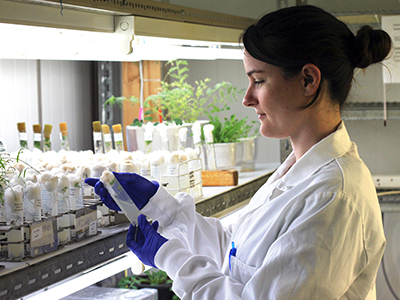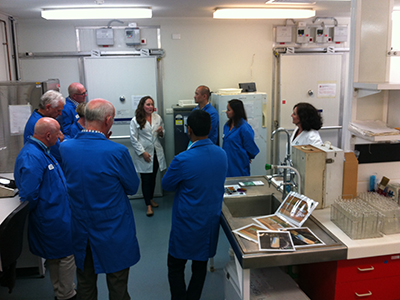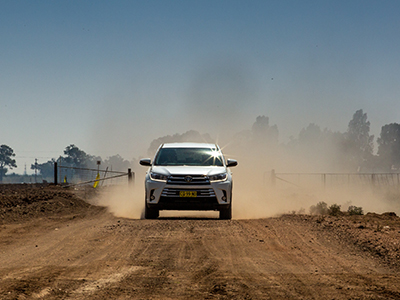
AIRG assure high quality rhizobia inoculant products
Adopting a supply-chain perspective to effective inoculant management
The AIRG takes a comprehensive approach in guiding the management of rhizobial inoculants across the supply chain. This extends to expert advice on storage, transport, preparation and application of products.
The Group has developed a suite of resources, bolstering its role in directing essential service providers, agronomists and primary producers towards authoritative guidelines and informative material developed by trusted industry bodies.
Navigate through the drop-down selections below to access valuable resources pertaining to rhizobial inoculants. These include communication materials for service providers and decision support checklists tailored to producers.
Contact
Australian Inoculants Research Group
NSW Department of Primary Industries and Regional Development
Elizabeth Macarthur Agricultural Institute
Woodbridge Rd, Menangle NSW 2568
Private Mail Bag 4008, Narellan NSW 2567
Email: airg@dpi.nsw.gov.au
Dr Tony Vancov, Researcher
AIRG, Soil & Water R&D Unit
Department of Primary Industries and Regional Development
Email: tony.vancov@dpi.nsw.gov.au
Inoculation – food for thought
Rhizobia are the living work force that attach themselves to the roots of healthy legume plants and produce nodules. These nodules fix atmospheric nitrogen gas (N2) and convert it into ammonia (NH3) that is used by the plant for its growth and development. In return, the plant provides the rhizobia with a habitat, nutrients and energy. The benefits come full circle when the legume dies, the nodule breaks down and the rhizobial nitrogen (N) content is released back into the soil.
Each type of legume is nodulated by a specific type of rhizobia. An Inoculant Group is a cluster of legumes nodulated by the same strain of rhizobia. Compatible, effective rhizobia, in the right concentrations, must exist in the soil before nodulation and symbiotic N fixation can occur.
Whilst Australian soils have developed substantial populations of rhizobia that are able to nodulate commonly grown agricultural legumes, they may be absent from the soil if the leguminous plant has not been previously grown or where the soil has constraints, such as soil acidity. Furthermore, once-off use does not mean the right species or population numbers will persist in the soil over an extended timeframe. In soils containing adequate populations, the communities are diverse and become less effective at fixing N over time. When applied in sufficiently high concentrations, inoculant strains can compete with less effective established soil rhizobia and replace them.
Inoculant Groups provide a framework for considering if inoculation is needed, based upon the legume previously grown in the same location, and choosing the correct inoculant for the new legume to be sown. The work of the AIRG underpins the availability and quality of commercially produced and marketed rhizobia for all Inoculant Groups.
Inoculation – improved production
The practice of inoculation is a minor production input cost with potentially substantial pay-back from increased grain, dry matter (DM) yield in pastures and additional N in the soil.
Generally, the cost of inoculating is less than $5/ha but research has demonstrated inoculation increased faba bean nodulation by more than 400 per cent, resulting in a 140 per cent yield improvement. Results are obviously dependent upon the baseline conditions, soil N content and rhizobia population of the soil into which the inoculated seed is being sown, but, on average inoculated legumes will fix 25kg of N per tonne of legume shoot DM. This provides a cheap supply of N to the growing plant as well as a good source of slow-release N for the following crop or companion grasses from decomposing legume residues.
Australian farmers inoculate about 5 million hectares of crop and pasture legumes annually. Essentially all the estimated 3.5 million tonnes of N fixed annually by legumes, can be attributed to either current or past inoculation, and is valued at $3.5 billion.
Inoculation products ready for the market – AIRG testing
There are 42 different Inoculant Groups produced in Australia, safe-guarded by independent testing of the AIRG. The AIRG maintains the policy of having single strain inoculants for all legume groups. Whilst commercial inoculant formulations are available in different forms, the AIRG currently assesses selected peat, freeze-dried and some granular inoculant batches produced by Australian and overseas manufacturers against stringent criteria. These criteria evaluate the ability of the strain of rhizobia to form nodules and the number of live rhizobia. Only when these standards have been met is the batch approved by AIRG to carry the Green Tick logo.
The AIRG tested and Green Ticked inoculants stand-out from others in store as labelling will always include:
- The Green Tick logo
- The legume/s for which the inoculant should be used
- Application methods
- Storage conditions
- Expiry date / shelf life
- Guaranteed number of rhizobia at point of sale
- A batch number
Non-quality assured inoculation products
Today, more than ever, there is a plethora of non-rhizobial products on store shelves, or promoted at field days, that may claim to provide yield benefits by improving the soil biology. As there is no transparent quality assurance program underpinning these products, it is important to ask the right questions about the research, development, trial and economic evaluation of these products for the grain or pasture that is being sown.
The service agreement held between the rhizobial inoculant manufacturers of Australia and AIRG upholds the quality supply of product for Australian producers. The cost of poor-quality nodulation, or failure, is immense to a farming business. The AIRG is highly regarded by Australian manufacturers of inoculant products, for not only for overseeing the Green Tick program, but for providing an opportunity to validate and give confidence to the commercial laboratory testing and quality assurance processes they conduct within their own businesses.
AIRG’s valued partners & collaborators
- BASF Agricultural Specialties Pty Ltd
- New Edge Microbials Pty Ltd
- Novozymes BioAg Ltd
- Grains Research & Development Corporation (GRDC)
- Legume Rhizobium Sciences (LRS) (formally Centre for Rhizobium Studies), Murdoch University
- South Australian Research and Development Institute (SARDI)
- University of Adelaide
- Queensland Department of Agriculture and Fisheries (QDAF)

Australian Inoculant Quality Assurance

Supply-chain partnerships for quality assured Australian inoculants

Maintaining inoculant efficacy - manufacture to farm

